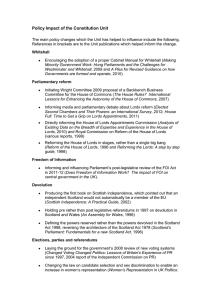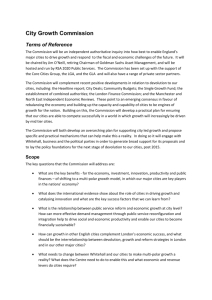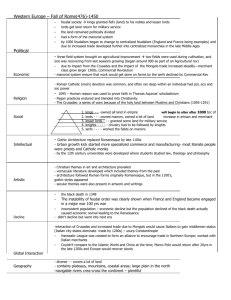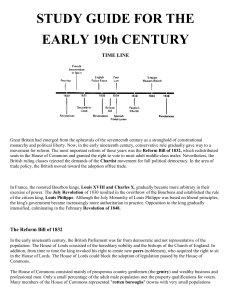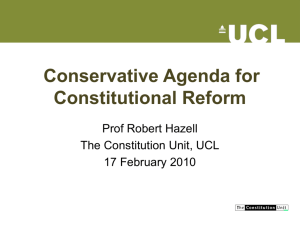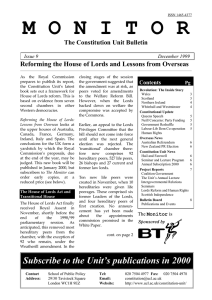Exam practice answers 5
advertisement
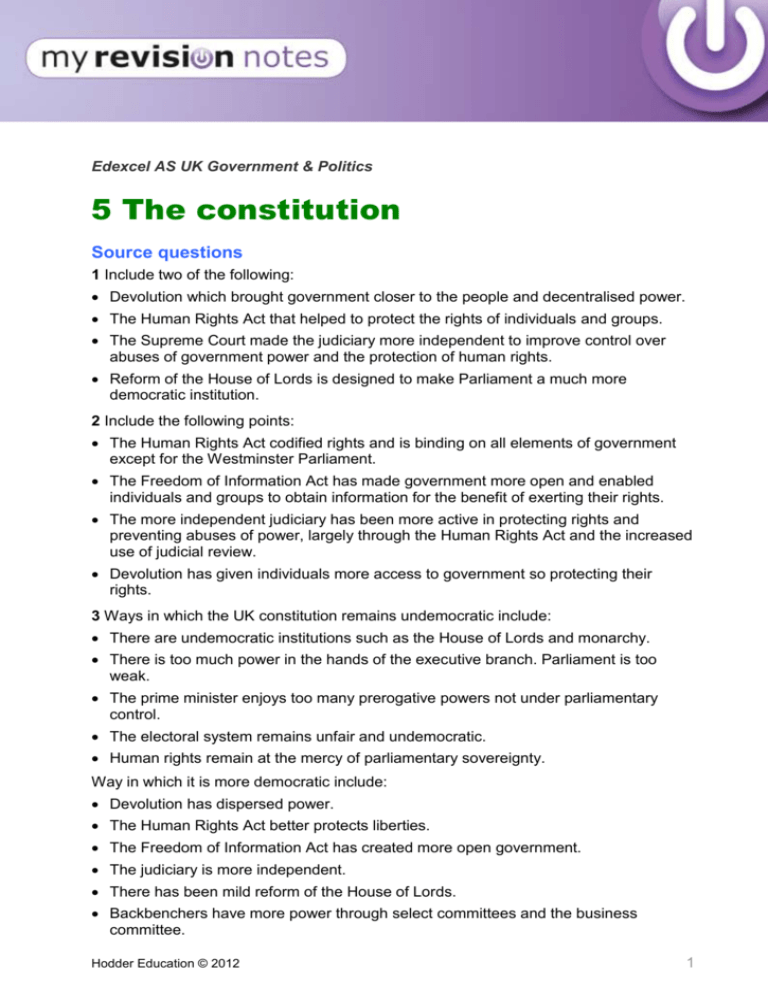
Edexcel AS UK Government & Politics 5 The constitution Source questions 1 Include two of the following: Devolution which brought government closer to the people and decentralised power. The Human Rights Act that helped to protect the rights of individuals and groups. The Supreme Court made the judiciary more independent to improve control over abuses of government power and the protection of human rights. Reform of the House of Lords is designed to make Parliament a much more democratic institution. 2 Include the following points: The Human Rights Act codified rights and is binding on all elements of government except for the Westminster Parliament. The Freedom of Information Act has made government more open and enabled individuals and groups to obtain information for the benefit of exerting their rights. The more independent judiciary has been more active in protecting rights and preventing abuses of power, largely through the Human Rights Act and the increased use of judicial review. Devolution has given individuals more access to government so protecting their rights. 3 Ways in which the UK constitution remains undemocratic include: There are undemocratic institutions such as the House of Lords and monarchy. There is too much power in the hands of the executive branch. Parliament is too weak. The prime minister enjoys too many prerogative powers not under parliamentary control. The electoral system remains unfair and undemocratic. Human rights remain at the mercy of parliamentary sovereignty. Way in which it is more democratic include: Devolution has dispersed power. The Human Rights Act better protects liberties. The Freedom of Information Act has created more open government. The judiciary is more independent. There has been mild reform of the House of Lords. Backbenchers have more power through select committees and the business committee. Hodder Education © 2012 1 Referendums are now used more often. Essay questions 4 Include the following arguments with some evaluation: A codified constitution would reduce the drift towards increased executive power, though a new constitution could put great power into the hands of government. However, there are advantages in having a flexible system. A new constitution may reduce the power of government too much. It would improve public awareness of the nature of government, though it may be too complex for many to understand. Human rights would be better protected, but only if parliamentary sovereignty over rights is abolished. It will increase public confidence in the political system, though problems here may be too deep for this to succeed. It would bring the UK into line with other modern European states, though many argue that the flexible UK system is superior. Some say it would be better entrenched, but there are strong arguments for flexibility. 5 Ways in which it is outdated include: It is not codified. It relies too much on convention and tradition. It contains outdated institutions such as the House of Lords and the monarchy. It has an outdated, undemocratic electoral system. It does not protect human rights sufficiently. Ways in which it is not outdated include: The Human Rights Act is modern. There has been some reform of the House of Lords. There is freedom of information. The judiciary is separate, in line with modern constitutions. Fixed-term parliaments are a modern development. 6 First, include the following points: Distinguish between legal and political sovereignty. Explain that legal sovereignty has not changed except for EU jurisdiction. Explain that political sovereignty is more flexible and constantly changes. Give examples of erosion, including: Devolution The Human Rights Act. The growing jurisdiction of the European Union. The increased use of referendums. Hodder Education © 2012 2 The drift towards executive power. The drift towards prime ministerial power Stress the retention of parliamentary powers: The power to veto legislation. The power to remove a government. Referendums are not totally binding. Parliament remains in ultimate control of human rights. 7 Examples of successes include the following: Devolution has proved successful and so far has prevented the disintegration of the UK. It has been very successful in Northern Ireland in securing peace. The Human Rights Act is widely used and has been effective. The Freedom of Information Act has seen a number of successful outcomes, such as MPs’ expenses. Mild reform of the House of Lords has made it more effective. Electoral reform in devolved assemblies has created proportionality. The judiciary is now more independent and more effective in preventing abuses of government and protecting rights. Examples of lack of success include: The House of Lords has not been effectively reformed. There has been no reform of the electoral system for Westminster elections. Many argue that rights are still not fully protected. The failure to codify has meant a continued drift towards executive power. Generally there remains widespread disillusionment with political processes. Hodder Education © 2012 3
